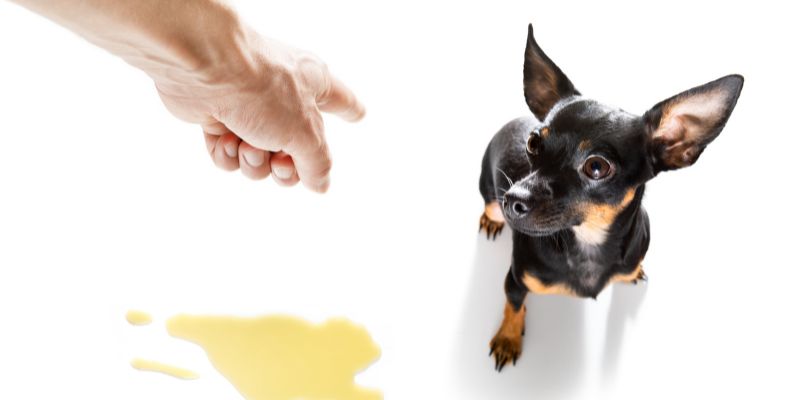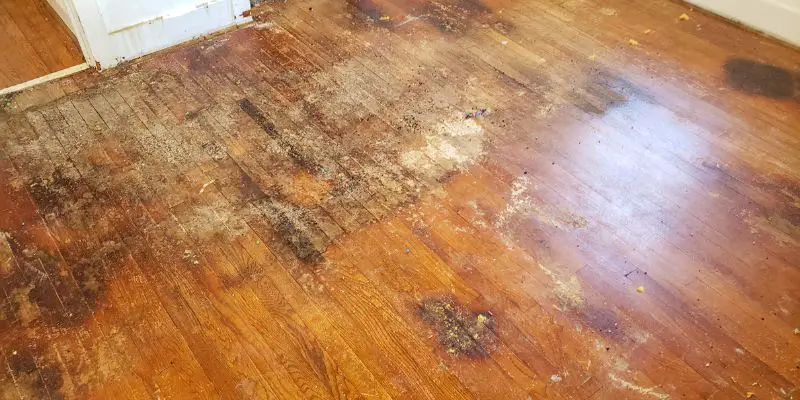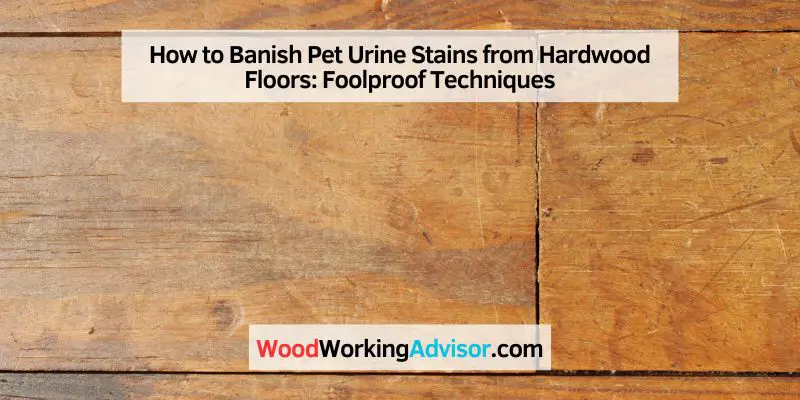To remove pet urine stains from hardwood floors, combine equal parts vinegar and water in a spray bottle and apply it to the stained area. Gently scrub the area with a soft cloth or sponge, then wipe away any excess moisture.
Pet urine stains on hardwood floors can be unsightly and difficult to remove. However, with the right approach, you can effectively eliminate these stains and restore the beauty of your hardwood floors. We will provide you with a simple and effective method for removing pet urine stains from hardwood floors.
By following these steps, you can easily tackle these stains and maintain the cleanliness and freshness of your home. So, let’s jump right into it and learn how to remove pet urine stains from hardwood floors.
Knowledge Pet Urine Stains
Want to know how to remove pet urine stains from hardwood floors? Learn the best tips and tricks to tackle these stubborn stains and keep your floors clean and odor-free.
If you have a furry friend at home, you know that accidents happen. One of the most common mishaps that pet owners face is pet urine stains on hardwood floors. These stains not only create an unpleasant odor but can also cause damage to your beautiful hardwood flooring. In this section, we will dive deeper into understanding pet urine stains and why it’s important to take quick action.
Why Pet Urine Stains Are A Problem
Pet urine stains are not only unsightly but can also pose several problems for your hardwood floors. Understanding the reasons behind these stains will help you tackle the issue effectively. Here are a few key points to consider:
1. Acidity: Pet urine is acidic in nature, and when left untreated, it can eat away at the protective finish of your hardwood floor. This can lead to discoloration, warping, and even permanent damage.
2. Bacteria and Odor: Along with urine, pet accidents can also introduce bacteria into your flooring. This can result in lingering odors and potential health hazards for you and your family.
3. Stain Penetration: If pet urine isn’t promptly cleaned, it can seep through the hardwood and into the subfloor, making it harder to remove the stain completely. This can also cause long-term odor issues and contribute to the growth of mold and mildew.
The Importance Of Quick Action
When it comes to pet urine stains on hardwood floors, time is of the essence. Taking immediate action can prevent the stains from becoming permanent and minimize the damage caused. Here’s why quick action is crucial:
1. Stain Prevention: Acting promptly helps prevent urine from penetrating deeper into the wood and causing lasting stains. By acting quickly, you can reduce the likelihood of needing costly repairs or, in extreme cases, floor replacement.
2. Odor Control: Promptly addressing pet urine stains helps prevent the development of strong odors. The longer the urine sits, the more bacteria can multiply, leading to a persistent and unpleasant smell in your home.
3. Maintaining Floor Integrity: By removing pet urine stains promptly, you help protect the integrity of your hardwood flooring. This helps ensure that your floors continue to look beautiful and can withstand daily wear and tear.
Remember, the sooner you address pet urine stains, the better chance you have of minimizing damage and maintaining the overall quality of your hardwood floors.
In the next section, we will explore effective methods and tips for removing pet urine stains from hardwood floors. Stay tuned for helpful solutions that will ensure your floors remain clean, fresh, and free from unsightly stains.

Identifying Hardwood Floor Damage
Got a pet urine stain on your hardwood floor? Learn how to identify and effectively remove the damage, leaving your floors looking fresh and clean.
Spotting Signs Of Damage
Before you can effectively remove pet urine stains from hardwood floors, it’s essential to first identify the extent of the damage. Spotting signs of damage will help you determine the appropriate treatment method for your specific situation.
One common sign of damage is discoloration on the surface of the hardwood floor. Urine stains typically leave a yellowish or brownish tint, which can be quite noticeable on lighter-colored floors. If you notice any unusual coloring or spots on your hardwood floor, it’s likely that pet urine has caused damage.
Another indicator of damage is a strong odor. Pet urine can emit a distinct and unpleasant smell, especially when it seeps into the wood. If you detect an unpleasant odor in the vicinity of your hardwood floor, it’s a clear indication that there may be urine stains that require attention.
Determining The Severity Of The Stain
Once you’ve identified the presence of urine stains on your hardwood floor, the next step is to determine the severity of the stain. This will help you understand the level of care and effort required to effectively remove the stain.
One way to gauge the severity is by looking at the size and extent of the stain. Is it a small isolated spot or does it cover a larger area? Larger stains may require more intensive cleaning techniques or professional intervention.
Additionally, consider the duration of the stain. Has it been present for a short period or has it been there for a while? Older stains may have penetrated deeper into the wood, making removal more challenging.
Lastly, examine the condition of the hardwood floor around the stain. Is the floor discolored and warped, or does it appear to be in good condition? Severe damage to the wood, such as warping or buckling, may require repair or replacement rather than just stain removal.
Preparing For Stain Removal
Learn how to effectively remove pet urine stains from hardwood floors with these easy tips and tricks. Keep your floors looking clean and fresh with simple stain-removal techniques that anyone can do.
Gather Necessary Supplies
Before you begin the task of removing pet urine stains from your hardwood floors, it’s essential that you gather all the necessary supplies. Having everything you need at hand will make the process easier and more efficient. Here are the items you’ll need:
| Supplies | Description |
|---|---|
| White vinegar | Helps neutralize urine odors |
| Water | Used for diluting vinegar |
| Hydrogen peroxide | Effective in removing stains |
| Spray bottle | Makes application easier |
| Soft cloth or sponge | For blotting the stain |
| Paper towels | Absorbent material for drying |
| Protective gloves | To keep your hands safe |
| Baking soda | Natural deodorizer |
| Hardwood floor cleaner | For overall floor cleaning |
Protective Measures For Your Hands And Floor
Before you start working on removing pet urine stains, take a moment to protect your hands and your beautiful hardwood floors. It’s important to prevent any damage to your skin and flooring during the stain removal process. Here are some steps you can take:
- Put on protective gloves to shield your hands from the cleaning solutions and potential skin irritation.
- Place old towels or blankets around the area you’ll be working on to protect the rest of your floor from any spills or splashes.
- If you don’t have old towels or blankets, consider using a plastic sheet or drop cloth instead.
- Make sure to ventilate the room by opening windows or using a fan to prevent the fumes from the cleaning solutions from accumulating.
By taking these protective measures, you can ensure a safe and clean environment while you remove pet urine stains from your hardwood floors.
Effective Techniques For Banishing Pet Urine Stains
Dealing with pet urine stains on hardwood floors can be a frustrating and unpleasant task. However, with the right techniques, you can effectively remove these stains and restore the beauty of your floors. In this article, we will explore three effective methods to banish pet urine stains from hardwood floors. Read on to learn more about blotting the stain, using a homemade vinegar solution, and applying a baking soda and hydrogen peroxide mixture.
Technique 1: Blotting The Stain
One of the first steps in removing pet urine stains from hardwood floors is to blot the stain as soon as possible. The key is to act quickly to prevent the urine from penetrating deeper into the wood and causing more damage. To do this, follow these simple steps:
- Wear gloves to protect your hands from any potential bacteria
- Place a clean cloth or paper towel over the urine stain
- Gently press down on the cloth to absorb the liquid
- Continue blotting until no more urine comes up
Remember, avoid rubbing the stain, as this can spread the urine and make it more difficult to remove.
Technique 2: Homemade Vinegar Solution
Vinegar is a natural cleaner that can effectively neutralize the odor of pet urine and break down the stain. Here is how to create a homemade vinegar solution:
- Mix equal parts of white vinegar and water in a spray bottle
- Shake the bottle to ensure the solution is well combined
- Spray the vinegar solution directly onto the urine stain
- Let the solution sit for a few minutes to allow it to penetrate the stain
- Using a clean cloth, gently wipe away the stain
- Rinse the area with water to remove any residue
Repeat this process until the stain is no longer visible or the odor is completely gone.
Technique 3: Baking Soda And Hydrogen Peroxide
If the pet urine stain is particularly stubborn, you can try using a mixture of baking soda and hydrogen peroxide. Here’s how to do it:
- In a small bowl, combine one tablespoon of baking soda and one cup of hydrogen peroxide
- Stir until the baking soda is dissolved
- Apply the mixture directly to the urine stain
- Gently scrub the stain using a soft brush
- Allow the mixture to sit on the stain for a few minutes
- Wipe away the stain with a clean cloth
Ensure that you rinse the area thoroughly with water and dry it completely to prevent any residue.
By utilizing these effective techniques of blotting the stain, using a homemade vinegar solution, and applying a baking soda and hydrogen peroxide mixture, you can successfully remove pet urine stains from your hardwood floors. Remember to act quickly, be patient, and repeat the steps as needed for best results. Say goodbye to unsightly stains and hello to beautifully restored floors!
Dealing With Lingering Odors
As pet owners, we all know accidents happen, and sometimes our furry friends leave behind unpleasant odors on our hardwood floors. The key to successfully removing pet urine stains is not only eliminating the visual evidence but also ensuring that any lingering odors are taken care of. In this section, we’ll discuss how to understand the source of these odors and provide effective solutions for odor elimination.
Understanding The Source Of Odors
Pet urine stains on hardwood floors can leave behind unpleasant odors due to various factors. It’s important to understand the source of these odors to effectively eliminate them.
Here are some common reasons for lingering pet urine odors:
- Penetration: If the urine has seeped deep into the hardwood, the odor may be stronger and more challenging to remove.
- Bacteria and enzymes: The breakdown of urea in pet urine by bacteria and enzymes can cause foul smells.
- Ammonia: As urine dries, it breaks down into ammonia, which contributes to the unpleasant odor.
By understanding these factors, we can choose the most appropriate solutions to eliminate the odors.
Odor Elimination Solutions
Now that we know the source of pet urine odors on hardwood floors, it’s time to explore effective solutions to eliminate them once and for all.
- Removing urine stains: Before tackling the odors, it’s essential to remove any visible urine stains from the hardwood floor. Using a gentle cleaning solution suitable for hardwood, gently scrub the affected area.
- Vinegar solution: Mix equal parts of white vinegar and water in a spray bottle. Spray the solution directly onto the stained area and let it sit for a few minutes. Then, use a clean cloth to wipe away the excess liquid.
- Hydrogen peroxide and baking soda: Create a paste by combining hydrogen peroxide and baking soda. Apply this paste to the stained area and let it sit for a few hours. Afterward, wipe away the paste and clean the area with a damp cloth.
- Enzymatic cleaners: Enzymatic cleaners are specifically designed to break down the bacteria and enzymes in pet urine that cause odors. Follow the instructions on the product and ensure the cleaner is safe for use on hardwood floors.
- Sealing the floor: If the odor persists even after thorough cleaning, consider sealing the hardwood floor. This can help prevent any remaining odor molecules from surfacing.
By utilizing these odor-elimination solutions, you can bid farewell to unpleasant smells and enjoy fresh and clean hardwood floors once again.

Preventive Measures
Pet urine stains on hardwood floors can be effectively removed by following simple preventive measures. These include immediate cleaning using a mixture of water and white vinegar, scrubbing gently with a soft cloth, and finishing off with a hardwood floor cleaner for a spotless and odor-free result.
Preventing pet urine stains on hardwood floors starts with proper training and utilizing protective barriers. By implementing these preventive measures, you can save yourself the hassle of dealing with stubborn stains and potential damage to your beautiful hardwood flooring.
Training Your Pet
Properly training your pet is the key to avoiding accidents and urine stains on your hardwood floors. When you bring a new pet into your home, whether it’s a new puppy or an older rescue, make sure to establish a consistent potty routine and provide frequent bathroom breaks.
In addition:
- Reinforce positive behavior by rewarding your pet with treats and praise when they successfully go outside or use their designated pee pad.
- Set up a designated potty area in your yard so your pet knows where they should go.
- Establish a regular feeding schedule to regulate their bathroom habits.
Utilizing Protective Barriers
Another effective way to prevent pet urine stains is by utilizing protective barriers that create a physical barrier between your pet and your hardwood floors. Consider the following options:
| Protective Barrier | Description |
|---|---|
| Area rugs or pet mats | Place area rugs or pet mats in areas where your pet spends the most time, such as by their bed or near the entrance to your home. These barriers will catch any accidents and protect your hardwood floors from urine stains. |
| Pet gates or playpens | Use pet gates or playpens to confine your pet to a specific area that is easier to clean, such as the kitchen or a tiled bathroom. This will help contain any accidents and prevent them from reaching your hardwood floors. |
| Pet diapers or belly bands | If you have an older or incontinent pet, consider using pet diapers or belly bands to prevent accidents on your hardwood floors. These products are designed to absorb urine and protect your floors from stains. |
By implementing these preventive measures, you can minimize the risk of pet urine stains on your hardwood floors and keep them looking pristine for years to come.
Conclusion
To conclude, removing pet urine stains from hardwood floors can be a challenging task, but with the right techniques and products, it is certainly possible. By acting quickly, using effective cleaning solutions, and employing gentle cleaning methods, you can restore the beauty of your hardwood floors and eliminate any lingering odors.
Remember to always test any new cleaning solution in an inconspicuous area before applying it to the stain. With a little patience and persistence, your hardwood floors will be looking fresh and clean once again.


